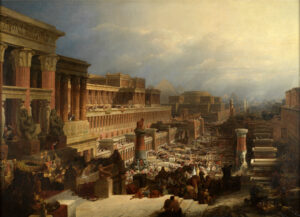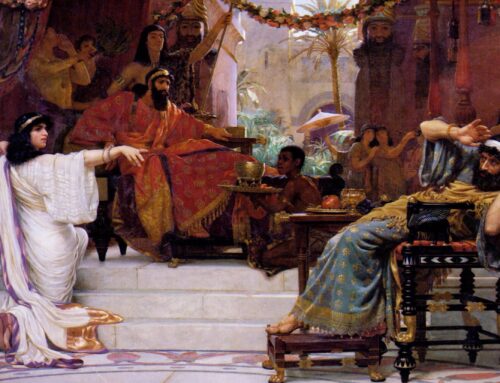Pesach – next year in Jerusalem
Pesach, the Feast of Unleavened Bread, is celebrated to commemorate the exodus from slavery and oppression in Egypt some 3,500 years ago. This is the most important Jewish holiday that has clearly defined Judaism. The Seder meal during Pesach ends with the phrase ”Next year in Jerusalem”.

The Exodus of the Israelites from Egypt, painted by the artist David Roberts in 1829. Photo: Birmingham Museum
Pesach, the Jewish Passover holiday, traditionally begins on the evening of 14 Nissan, which this year falls on April 22. This is the fundamental and most important holiday in Judaism and it has shaped and defined the entire Jewish religious practice.
The exodus from Egypt under the leadership of Moses, the 40-year wandering in the desert, the receiving of the Ten Commandments on Mount Sinai and the entry into the Promised Land, as well as all the miracles that took place through divine intervention are documented in the Torah, the five books of Moses.
The call to celebrate the Feast of Unleavened Bread annually, from generation to generation, is followed by Jews all over the world, even today, 3500 years later. The story of this holiday is at the heart of Judaism. Their obedient response to the command given to the Jewish people to tell the story of this deliverance to future generations is why the Jews still survive as a people after 2000 years of dispersal.
The Seder meal begins
Pesach is celebrated for seven days in Israel and for eight days by the Jews in the Diaspora. Right up until the destruction of the temple in AD 70, lambs were slaughtered in Jerusalem’s temple area at Pesach. Today a seder meal is eaten instead, during the first two Pesach evenings (in Israel only the first evening).
During the holiday, only unleavened bread, matza, is eaten, to remind the people that the bread did not have time to rise before the people’s flight from Egypt. The meal begins with a blessing over a glass of wine and is designed as an educational lesson for the children in which the story is recounted of the exodus from Egypt along with the liberation of the Jewish people from slavery.
The Hebrew word Pesach means “to pass by” which the English term for Pesach “passover” clarifies. The name refers to the angel of death who ‘passed by’ the doors that had the blood of a slain lamb smeared on their doorposts, allowing the firstborn Jewish sons to survive.
Jerusalem in focus
The phrase that traditionally ends the seder meal is “Next year in Jerusalem.” The city was always in focus for the Jews who were forced from their land and from their temple almost 2000 years ago. Psalm 137 also describes how the Jews who were exiled to Babylon 600 years earlier sat and wept and dreamed of Zion, the city of David: “If I forget you, Jerusalem, then my right hand will forget to play” (verse 7).
The Pesach days is also mentioned in the New Testament in what has come to be called the last meal, when Jesus and his 12 disciples, who by the way were all Jewish, would celebrate the Feast of Unleavened Bread in Jerusalem.
The story of the children of Israel’s exodus from Egypt has shaped not only Judaism but large parts of Western culture and jurisprudence which rest on Judeo-Christian ethics and morality.
Even today, the battle for Zion and the battle for Jerusalem continues, as Israel’s existential struggle against the enemies who today want to oppress the people and destroy the country clearly shows. At the forefront of this battle are Islamists in Iran, with the terrorist groups Hamas, Hezbollah, Islamic Jihad and the Houthi movement as their proxies.
After the Seder meal, a goblet is filled with wine for the prophet Elijah. This “cup of Elijah” will announce the arrival of the Messiah. At the same time, a prayer is read that God will once again free the Jewish people from their oppressors.



